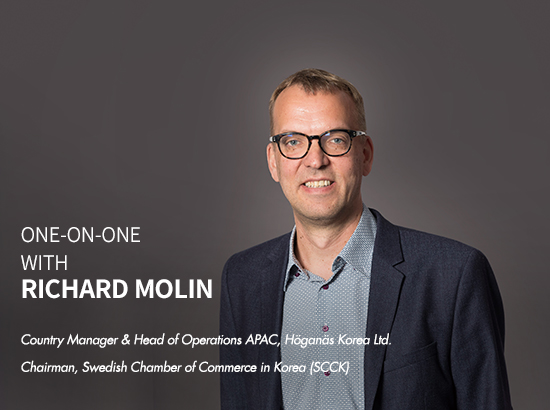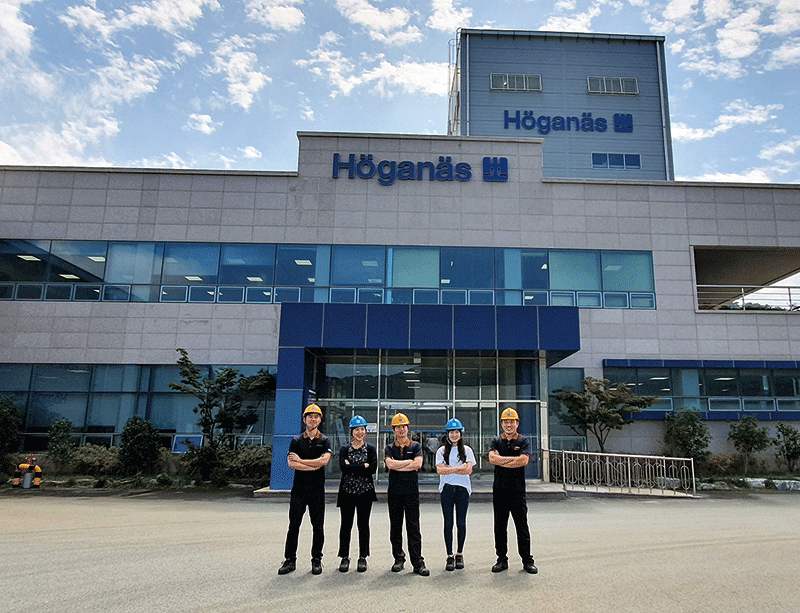Feature Stories
- Home
- Why KOREA
- Feature Stories

Höganäs is the world leader in metal powder development and production. Together with its customers, the company develops tomorrow's automotive components and electric drivelines, as well as high temperature brazing solutions, systems for sustainable energy creation and green treatment of water and soil. Höganäs was founded in 1797 and is today privately owned by Lindéngruppen and FAM. In 2017, the company had a turnover of MSEK 10,360. Höganäs Korea was established in 1992 as a sales office in Seoul. Then in 2014, a local plant was inaugurated in Busan to supply metal powders to the Korean market.
Richard Molin, country manager for Höganäs Korea, has been responsible for Höganäs’ operations within Asia since 2017. He started his first position at the company in 1999 in logistics after graduating with a Master of Science degree in mechanics from the Faculty of Engineering at Lund’s University in Sweden, and has since then held various positions within supply chain and sourcing.
He now lives in Seoul with his wife and their two boys who all enjoy life here, and is also adding to his knowledge by studying for an MBA at the Imperial College in London.
Read on to gain insight into Korea’s business environment, material and components industry, as well as Molin’s experience doing business here.
How did you become interested in Korea?
I had visited Korea and some other Asian countries many times during my years working in logistics and supply chain. I’ve always been fascinated by how much quicker everything is done here compared to Europe and Sweden. New things are happening all the time and everyone is open to try them out.
When I was offered the position as country manager, it did not take very long for me to decide to make the transition. Korea is a very modern country with fast development, which is very attractive. For a European like me, it is also different and exciting. I brought the whole family to visit before making the decision to move here, and as soon as we got in the taxi from the airport, we already knew this would be a great place to live.
What made Höganäs establish a branch here?
The usage of metal powders has varied a lot over the years. Early on, around 1970, the biggest field of usage was welding, in which the powder is used for electrode coatings. Korea, with all its shipbuilding, became one of the biggest and most important markets for Höganäs. At that time, the company used an agency to handle the sales aspect. Even today, we find some of our biggest and most important customers for welding powders here in Korea, where our business has been ongoing for many years and the relationships are excellent.
When metal powders later became an important part of the process in making car components, Höganäs was quick to set up a sales channel in Asia where powders were sold mainly in Japan. When Korea’s car production started to grow, we established our office here, and have since then been an essential part of building up this industry in the country. Today, Korea is one of the most important markets for us globally, and many new projects happen here.
What are the advantages of doing business in Korea?
In my view, Koreans are one of the most open people to try new things. Our customers are at the forefront of technology and always see the possibilities of trying new things and working together to learn something new. Our products are typically not so high-tech and many products have a very long life-cycle. But in the last decade, we’ve seen globally that the earliest adaptors that love innovation are found in Korea. That is very well in line with Höganäs’ vision to develop and improve our offerings so that when we want to try out a new product and get good feedback from consumers, we always reach out to customers here. Our R&D department also works closely with our customers who always give us great challenges and requests, which means that we improve as suppliers.
I also really appreciate the great relationships and hospitality that is offered whenever we meet our Korean customers or partners. Doing business here is straight-forward and you need to be honest and stand for what you say. In return, you get good contacts who you can work closely with and also enjoy some time together after work and meetings to have dinner and talk about things other than work. When problems or issues arise in daily business, my experience is that we always manage to find pragmatic solutions to the problems that both parties are O.K. with and we can avoid arguing about contract clauses and who is to blame.

This photo, provided by Hoganas, shows the company's plant located in Busan, S. Korea.
Were there any specific strategies that Höganäs established to better adapt to the Korean market?
Some things are a bit different here compared to other countries. This is one of the few markets where we have had mainly local staff and management from the beginning, compared to most other countries where we’ve placed Swedish management from the start.
Here in Korea, it took 25 years of running the business locally before I came. Working with Korean customers takes a Korean attitude and the language skillset. Now, we are preparing for more investments with the aim to supply not only within Korea but the whole APAC market, and this is one of the main reasons why I am here.
What opportunities in Korea are Swedish companies most interested in investing in?
Korea is the perfect market for most companies. In a relatively small area, you have access to a big population that is fairly easy to access thanks to good infrastructure. An increasing number of people are in a good financial situation and can spend more money on what they need and like. As I mentioned, Korean consumers are very interested in trying out new things. Sweden is popular in Korea and our design is highly appreciated. This means that many customer-oriented companies with a high level of design find Korea particularly of interest.
What advice would you give Swedish investors/companies seeking to enter the Korean market?
Even if Korea is a great market and we come with good products and services, we must be humble and understand that local companies are working really hard and already have access to the benefits of being from here.
This means that often times, the first step is about finding the right partners to work with. The Korean system is not necessarily easy for a foreigner and there is the obstacle of not speaking the language when it comes to establishing yourself here. So, once you start by finding good partners, the second step to make sure that you find good local people to work with.
What Korean companies/government agencies do you work with to strengthen your business partnerships?
First of all, we work very closely with our customers and try to create alliances where we develop new solutions and products together. In Korea, we also have good relationships with some of our competitors and we can meet and exchange ideas about how to grow the market jointly along with our customers.
There are also many associations that bring various companies and stakeholders together to strengthen the industry as a whole—making sure that education and recruitment in the industry works well, and that universities are conducting enough research to help to create new innovations.
I am also the Chairman of the Board at the Swedish Chamber of Commerce, where we try to get most of the Swedish companies here to come together and utilize each other for help and inspiration wherever it makes sense.
How can Korea become a more ideal business environment for foreign companies like Höganäs? ?
As mentioned before, one of the big obstacles is still the language. More information and services available in English would make it much easier to keep a close eye on market possibilities. It can be difficult to get by without a translator. Even with the English level improving a lot these days, there are so many day-to-day situations where it is difficult for a foreigner with a limited knowledge in Korean to manage.
We have been active in Korea for more than 25 years, and we are preparing to start construction of our second plant. However, we still have some big challenges to understand in terms of rules and regulations in various areas. So, in some cases, clearer rules could be very useful. But on the other hand, one of Korea’s charms is that anything is possible—you just need to figure out how.
What are some future plans that Höganäs has in terms of doing business in Korea and in Asia?
For us, Asia has become the absolutely most important market globally over the last 15 years. Today, we are selling close to 40 percent of the group’s sales in Asia, with both the growth and development in new areas happening much quicker than in other places. This means that whenever we consider new investments, we think Asia.
As one example, Höganäs had plans to start construction on a new plant this year in Busan, which would have been the most modern plant within the group. Here, we will prepare ourselves for a future where powders will be required to be used in new applications such as 3D printing. This plant will provide the entire Asian market with powder. We’ve selected Korea as the best location in Asia based on our great track-record for the existing plant that we already have in Busan, which is one of the safest, most productive plants we have in the world. Unfortunately, the global COVID-19 situation has made these types of big investments more difficult, so we had to postpone our project, but I look forward to resuming the plans in a few years.
By Grace Park
Executive Consultant
Investment Public Relations Team / Invest Korea
Korea Trade-Investment Promotion Agency (KOTRA)
gracepark@kotra.or.kr










